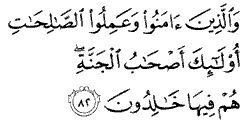Salih, Light, Fear
Issue 787 » April 25, 2014 - Jumada al-Thani 25, 1435
Living The Quran
Salih
Al-Baqara (The Cow) Chapter 2: Verse 82
 "Those who believe and do good works (salihat); such shall be the inhabitants of Paradise, to dwell therein forever."
"Those who believe and do good works (salihat); such shall be the inhabitants of Paradise, to dwell therein forever."
The strongest tie of semantic relationship binds salih and iman together into an almost inseparable unit. Just as the shadow follows the form, wherever there is iman there is salihat or, 'good works', so much so that we may almost feel justified defining the former in terms of the latter, and the latter in terms of the former. In brief, the salihat are 'belief' fully expressed in outward conduct. And so it comes about that the expression: alladhina amanu wa-amilu al-salihat, 'those who believe and do salih deeds', is one of the most frequently used phrases in the Quran. 'Those who believe' are not believers unless they manifest their inner faith in certain deeds that deserve the designation of salih. What are, then, these 'good works'? It is clear contextually that the 'good works' are those works of piety that have been enjoined by God upon all believers.
Compiled From:
"Ethico Religious Concepts in the Quran" - Toshihiko Izutsu, pp. 204, 205
Understanding The Prophet's Life
Light
In a hadith related by Abd Allah ibn Umar, the Prophet (peace be upon him) said, "God created His creation in darkness and then cast some of His light upon it. Those who were struck by that light were guided, those whom it missed went astray." [Tirmidhi]
This great hadith is one of the foundations of faith and opens one of the greatest doors to the mystery of destiny and divine wisdom. God is the One who grants accord.
This light which God cast upon them gave them both life and direction. Their pure God-given nature had its portion of this light, but by itself it was incomplete. So He completed it by way of the spirit, which He sent to the Prophets, and the light which He revealed to them. This is how God-given nature rediscovers the pre-existent light that reached it on the day the light was cast. The light of revelation and prophecy joined with the light of God-given nature. Hearts glow, faces shine, souls are vivified, the body inclines to His worship willingly and hearts add life to their life.
Compiled From:
"The Invocation of God" - Ibn Qayyim al-Jawziyya, p. 77
Blindspot!
Fear
Nurturing collective fears can directly affect the right of individuals, and equality of treatment. Centres of power (political, economic, military-industrial or media-based) sometimes decide to fuel, or even create, threats and dangers for national, international, economic and/or geostrategic reasons. The climate of fear and insecurity makes citizens accept measures that restrict the rights they have won, or even differential forms of treatment that are justified by the threat itself. There is nothing new about this strategy, but its strength is amplified by the power of modern means of communication. An enemy is created, his ability to do harm is demonized and the public is encouraged to draw the logical consequences from the situation: ‘You are afraid. We will guarantee your security, but in order to do that we must take exceptional measures – keep you under surveillance, keep the enemy under surveillance – and may sometimes have to encroach upon your rights, dignity or equality.’ The exceptional nature of the threat justifies the suspension of existing laws: fear is indeed the enemy of law. All dictators have, to varying degrees, used – and use – this method to justify their policies. What we are witnessing today with the ‘war on terrorism’ is of a similar nature and produces similar consequences: when fear rules and when security is under threat, rules no longer apply and rights can be reconsidered, personal integrity can be violated. Equality becomes a matter of wishful thinking, and the majority of the population, which is subjected to psychological and media brainwashing, gradually comes to accept the implications of the threat.
Compiled From:
"The Quest for Meaning" - Tariq Ramadan, pp. 78, 79